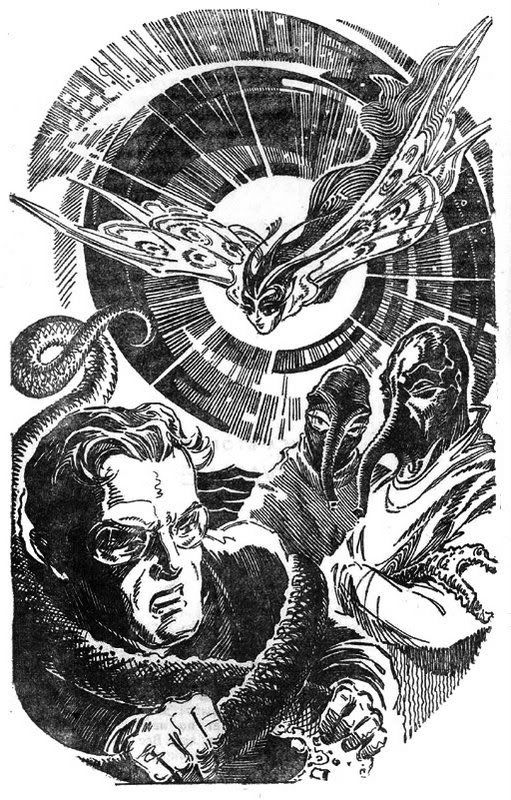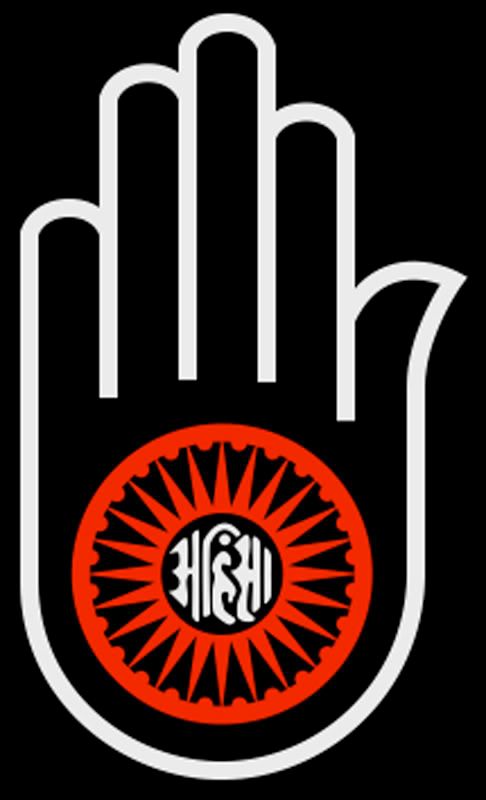"The magnitude of the problem is enormous"
It has taken a little while, but the Mainstream Media seems to be catching on....welcome to reality.
Wednesday, May 21, 2008
Monday, May 19, 2008
No Exit
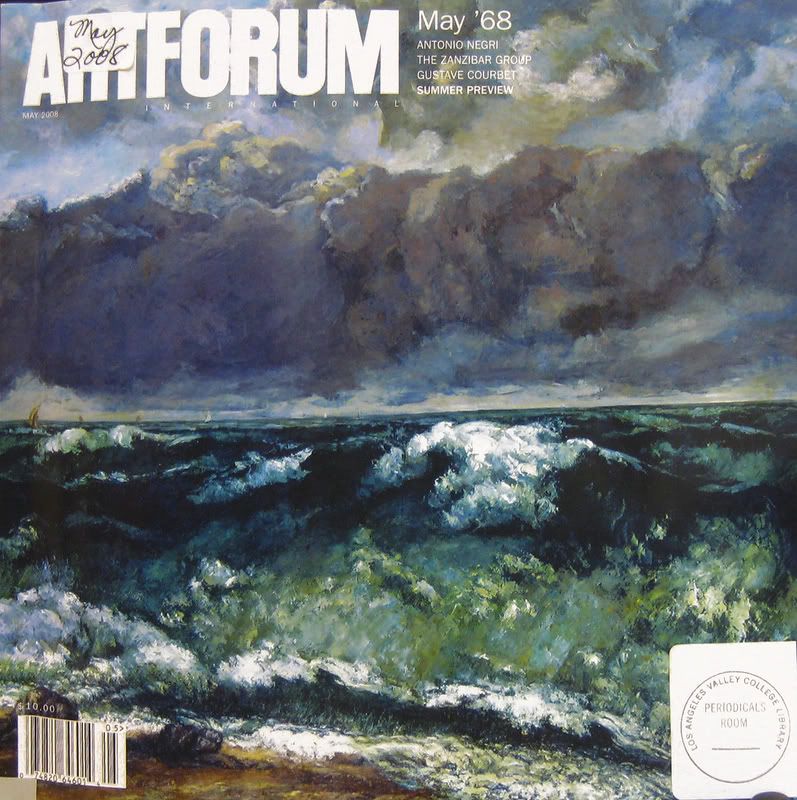
Escape through irony and critical self-awareness is any case itself an illusion: at best it provides only momentary relief. Distancing soon becomes a routine in its own right. Awareness commenting on awareness creates an escalating cycle of self-consciousness that inhibits spontaneity. It intensifies the feelings of inauthenticity that rise in the first place out of resentment against the meaningless roles prescribed by modern industry. Self-created roles become as constraining as the social roles from which they are meant to provide ironic detachment. We long for the suspension of self-consciousness, of the pseudoanalytic attitude that has become second nature: but neither art nor religion, historically the great emancipators from the prison of the self, retain the power to discourage disbelief. In a society based so largely on illusions and appearances, the ultimate illusions, art and religion, have no future. Credo quia absurdum, the paradox of religious experience in the past, has little meaning in a world where everything seems absurd, not merely the miracles associated with religious faith and practice.
Christopher Lasch, The Culture of Narcissism
Thursday, May 15, 2008
Monday, May 12, 2008
why dark ?
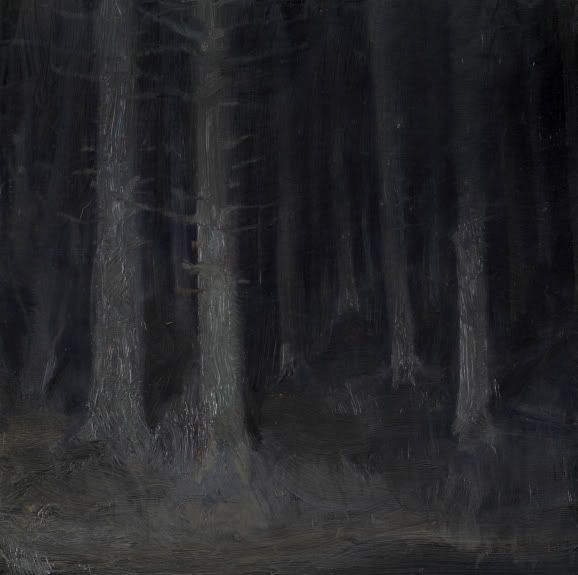 Ruprecht von Kaufmann
Ruprecht von Kaufmann....because the brighter a light shines, the more darkness it reveals
Unfortunately there can be no doubt that man is, on the whole, less good than he imagines himself or wants to be. Everyone carries a shadow, and the less it is embodied in the individual's conscious life, the blacker and denser it is. If an inferiority is conscious, one always has a chance to correct it. Furthermore, it is constantly in contact with other interests, so that it is continually subjected to modifications. But if it is repressed and isolated from consciousness, it never gets corrected.
"Psychology and Religion" (1938). In CW 11: Psychology and Religion: West and East. P.131
How else could it have occurred to man to divide the cosmos, on the analogy of day and night, summer and winter, into a bright day-world and a dark night-world peopled with fabulous monsters, unless he had the prototype of such a division in himself, in the polarity between the conscious and the invisible and unknowable unconscious? Primitive man's perception of objects is conditioned only partly by the objective behaviour of the things themselves, whereas a much greater part is often played by intrapsychic facts which are not related to the external objects except by way of projection. This is due to the simple fact that the primitive has not yet experienced that ascetic discipline of mind known to us as the critique of knowledge. To him the world is a more or less fluid phenomenon within the stream of his own fantasy, where subject and object are undifferentiated and in a state of mutual interpenetration.
"Psychological Aspects of the Mother Archetype" (1939) In CW 9, Part 1: The Archetypes and the Collective Unconscious. P. 187
The hero's main feat is to overcome the monster of darkness: it is the long-hoped-for and expected triumph of consciousness over the unconscious. The coming of consciousness was probably the most tremendous experience of primeval times, for with it a world came into being whose existence no one had suspected before. "And God said, 'Let there be light"' is the projection of that immemorial experience of the separation of consciousness from the unconscious.
"The Psychology of the Child Archetype" (1940). In CW 9, Part I: The Archetypes and the Collective Unconscious. P.284
If you imagine someone who is brave enough to withdraw all his projections, then you get an individual who is conscious of a pretty thick shadow. Such a man has saddled himself with new problems and conflicts. He has become a serious problem to himself, as he is now unable to say that they do this or that, they are wrong, and they must be fought against. He lives in the "House of the Gathering." Such a man knows that whatever is wrong in the world is in himself, and if he only learns to deal with his own shadow he has done something real for the world. He has succeeded in shouldering at least an infinitesimal part of the gigantic, unsolved social problems of our day.
"Psychology and Religion" (1938). In CW 11: Psychology and Religion: West and East. P.140
Taking it in its deepest sense, the shadow is the invisible saurian tail that man still drags behind him. Carefully amputated, it becomes the healing serpent of the mysteries. Only monkeys parade with it.
The Integration of the Personality. (1939).
Sunday, May 11, 2008
Denial

Denial is a defense mechanism' postulated by Sigmund Freud, in which a person is faced with a fact that is too uncomfortable to accept and rejects it instead, insisting that it is not true despite what may be overwhelming evidence.
Types of Denial
Denial of fact: This form of denial is where someone avoids a fact by lying. This lying can take the form of an outright falsehood (commission), leaving out certain details in order to tailor a story (omission), or by falsely agreeing to something (assent, also referred to as "yesing" behavior). Someone who is in denial of fact is typically using lies in order to avoid facts that they think may be potentially painful to themselves or others.
Denial of responsibility: This form of denial involves avoiding personal responsibility by blaming, minimizing or justifying. Blaming is a direct statement shifting culpability and may overlap with denial of fact. Minimizing is an attempt to make the effects or results of an action appear to be less harmful than they may actually be. Justifying is when someone takes a choice and attempts to make that choice look okay due to their perception of what is "right" in a situation. Someone using denial of responsibility is usually attempting to avoid potential harm or pain by shifting attention away from themselves.
Denial of impact: Denial of impact involves a person avoiding thinking about or understanding the harms their behavior have caused to themselves or others. By doing this, that person is able to avoid feeling a sense of guilt and it can prevent that person from developing remorse or empathy for others. Denial of impact reduces or eliminates a sense of pain or harm from poor decisions.
Denial of awareness: This type of denial is best discussed by looking at the concept of state dependent learning. People using this type of denial will avoid pain and harm by stating they were in a different state of awareness (such as alcohol or drug intoxication or on occasion mental health related). This type of denial often overlaps with denial of responsibility.
Denial of cycle: Many who use this type of denial will say things such as, "it just happened." Denial of cycle is where a person avoids looking at their decisions leading up to an event or does not consider their pattern of decision making and how harmful behavior is repeated. The pain and harm being avoided by this type of denial is more of the effort needed to change the focus from a singular event to looking at preceding events. It can also serve as a way to blame or justify behavior (see above).
Denial of denial: This can be a difficult concept for many people to identify in themselves, but is a major barrier to changing hurtful behaviors. Denial of denial involves thoughts, actions and behaviors which bolster confidence that nothing needs to be changed in one's personal behavior. This form of denial typically overlaps with all of the other forms of denial, but involves more self-delusion.
Friday, May 9, 2008
strike through the mask

All visible objects, man, are but as pasteboard masks. But in each event — in the living act, the undoubted deed — there, some unknown but still reasoning thing puts forth the mouldings of its features from behind the unreasoning mask. If man will strike, strike through the mask! How can the prisoner reach outside except by thrusting through the wall? To me, the white whale is that wall, shoved near to me. Sometimes I think there's naught beyond. But 'tis enough. He tasks me; he heaps me; I see in him outrageous strength, with an inscrutable malice sinewing it. That inscrutable thing is chiefly what I hate; and be the white whale agent, or be the white whale principal, I will wreak that hate upon him. Talk not to me of blasphemy, man; I'd strike the sun if it insulted me. For could the sun do that, then could I do the other; since there is ever a sort of fair play herein, jealousy presiding over all creations. But not my master, man, is even that fair play. Who's over me? Truth hath no confines.
Ahab to Starbuck
Wednesday, May 7, 2008
Eugene Von Bruenchenhein
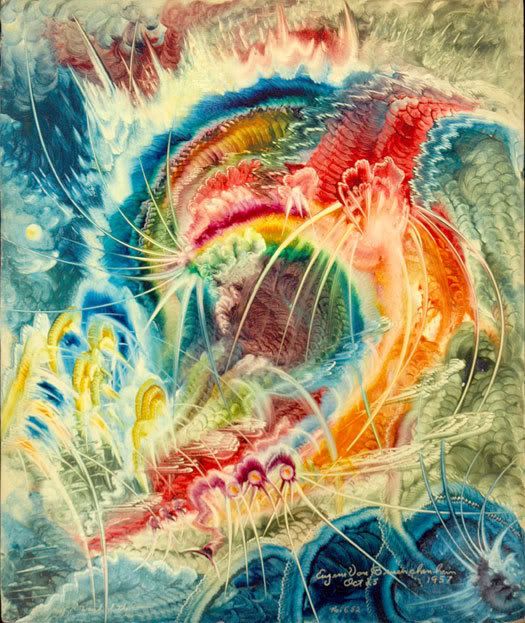 Eugene Von Bruenchenhein
Eugene Von Bruenchenhein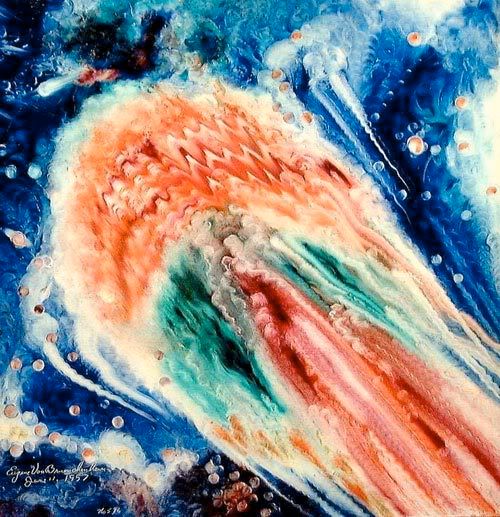 Eugene Von Bruenchenhein
Eugene Von BruenchenheinEugene Von Bruenchenhein (1910-1983) was a visionary artist who created a vast number of paintings, photographs and sculptural objects that overfilled his modest house in Milwaukee, a collection undiscovered until shortly after his death. He worked at a bakery during the day and privately made his obsessive art in virtual isolation, with the exception of his wife, Marie, and select relatives and friends.
Eugene Von Bruenchenhein at KINZ, TILLOU + FEIGEN
André Ethier
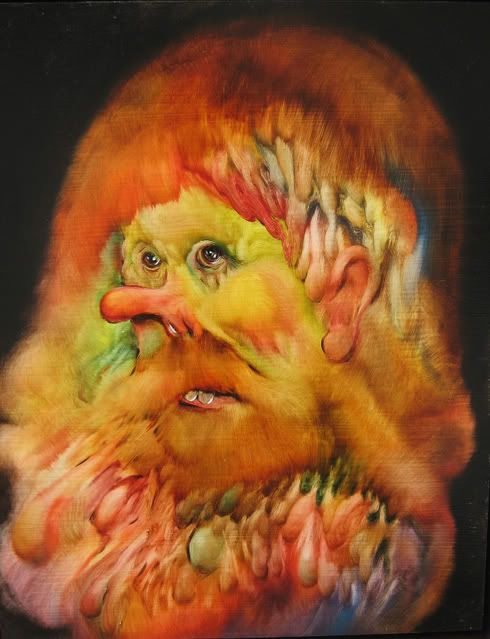 André Ethier
André EthierI was going to write something cool about daemons and Patrick Harpur but I'm just too lazy. Good show though, you should check it out......
André Ethier at Honor Fraser
Monday, May 5, 2008
Sailing to Byzantium

That is no country for old men. The young
In one another's arms, birds in the trees
- Those dying generations - at their song,
The salmon-falls, the mackerel-crowded seas,
Fish, flesh, or fowl, commend all summer long
Whatever is begotten, born, and dies.
Caught in that sensual music all neglect
Monuments of unageing intellect.
An aged man is but a paltry thing,
A tattered coat upon a stick, unless
Soul clap its hands and sing, and louder sing
For every tatter in its mortal dress,
Nor is there singing school but studying
Monuments of its own magnificence;
And therefore I have sailed the seas and come
To the holy city of Byzantium.
O sages standing in God's holy fire
As in the gold mosaic of a wall,
Come from the holy fire, perne in a gyre,
And be the singing-masters of my soul.
Consume my heart away; sick with desire
And fastened to a dying animal
It knows not what it is; and gather me
Into the artifice of eternity.
Once out of nature I shall never take
My bodily form from any natural thing,
But such a form as Grecian goldsmiths make
Of hammered gold and gold enamelling
To keep a drowsy Emperor awake;
Or set upon a golden bough to sing
To lords and ladies of Byzantium
Of what is past, or passing, or to come.
William Butler Yeats
Friday, May 2, 2008
Thursday, May 1, 2008
Subscribe to:
Posts (Atom)

